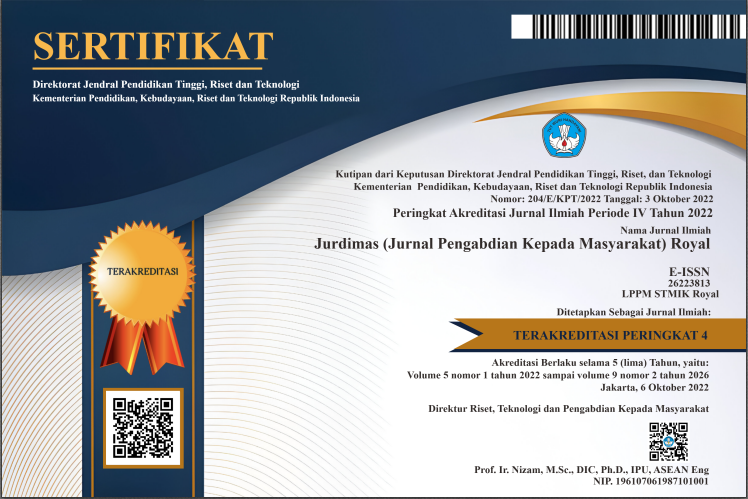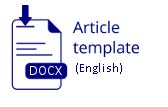e-BINTECH 5.0: Desa Siaga COVID-19 Berbasis Edubioneurolitechnopreneurship Menuju Indonesia 5.0
Abstract
Abstract: The e-Bintech 5.0 online workshop was held to sharpen the concept of village 5.0 that is a multidisciplinary acculturation-constellation. In this workshop, multiplatform frameworks were successfully formulated as a basic guideline for village developments towards the glory of Indonesia. Pentahelix platform synergy is needed (academics, business, government, community, media) supported by relevant stakeholders for fostering a futuristic village towards the creation of Indonesia 5.0, especially in terms of ease of investment, simplification of bureaucracy and administration.
Key Words: edubioneurolitechnopreneurship; Indonesia 5.0; pentahelix; village 5.0
Abstrak: Lokakarya daring e-Bintech 5.0 diadakan untuk menajamkan konsep desa 5.0 yang merupakan akulturasi-konstelasi multidisipliner. Dalam lokakarya ini, berhasil dirumuskan multiplatform-frameworks sebagai pedoman dasar pengembangan-pembangunan desa menuju kejayaan Indonesia. Diperlukan sinergi platform pentahelix (akademisi, bisnis, pemerintah, komunitas, media) didukung stakeholders terkait untuk pembinaan desa futuristik menuju terciptanya Indonesia 5.0, terutama dalam hal kemudahan investasi, simplifikasi birokrasi dan administrasi.
References
Azhar, R. A. (2019). Lamahu, Desa Digital Pertama di Indonesia. Retrieved from https://regional.kompas.com/read/2017/04/07/07070001/lamahu.desa.digital.pertama.di.indonesia
Benke, K., & Benke, G. (2018). Artificial intelligence and big data in public health. International Journal of Environmental Research and Public Health, 15(12). https://doi.org/10.3390/ijerph15122796
Biehl, J. K., & Russell, B. (2009). Introduction to Stem Cell Therapy. Journal of Cardiovascular Nursing, 24(2), 98–103. https://doi.org/10.1097/JCN.0b013e318197a6a5
Bintoro, D. (2020). Cilacap Tetapkan Desa Siaga Covid-19 Pertama Di Bulupayung.
BNPB. (2020). Strategi Komunikasi Perubahan Perilaku (KPP) Dalam Pencegahan Covid-19. 1–48.
Fedi, A., Mannarini, T., & Maton, K. I. (2009). Empowering Community Settings and Community Mobilization. Community Development, 40(3), 275–291. https://doi.org/10.1080/15575330903109985
Howard, G. (2002). Personal, domestic and community hygiene. Healthy Villages: A Guide for Communities and Community Health Workers, 65–73.
Kemenkes RI. PERATURAN MENTERI KESEHATAN REPUBLIK INDONESIA NOMOR 8 TAHUN 2019 TENTANG PEMBERDAYAAN MASYARAKAT BIDANG KESEHATAN. , (2019).
Kemenkes RI. (2020). Pedoman Pemberdayaan Masyarakat dalam Pencegahan COVID-19. Retrieved from https://covid19.go.id/edukasi/masyarakat-umum/pedoman-pemberdayaan-masyarakat-dalam-pencegahan-covid-19-di-rtrwdesa
Marala, R., Wibowo, H., & Kurniawan, R. R. (2019). Model Pengelolaan Badan Usaha Milik Desa (BUMDes) Dalam Membangun Perekonomian Desa (Studi Kasus Desa Masalima). Jurnal Ekonomi Dan Perbankan Syariah, 6(1), 107–134. https://doi.org/10.46899/jeps.v6i1.90
MILT. (2019). WHITE PAPER ON LAND , INFRASTRUCTURE , TRANSPORT AND TOURISM IN JAPAN. Retrieved from https://www.mlit.go.jp/common/001325161.pdf
Morimoto, E., & Hayashi, K. (2017). Design of Smart Agriculture Japan Model. Advances in Animal Biosciences, 8(2), 713–717. https://doi.org/10.1017/s2040470017000371
Parikesit, A. A., Pradana, Ratnasari, N. R., & Anurogo, D. (2021). Application of Artificial Intelligence-Based Computation in the Health Sciences to Ward off the COVID-19 Pandemic. International Journal of Human and Health Sciences, 05(02), 177–184. https://doi.org/10.1177/1461444810365020
Pavlovic, M., & Radotic, K. (2017). Animal and Plant Stem Cells: Concepts, Propagation and Engineering. Animal and Plant Stem Cells: Concepts, Propagation and Engineering, 1–234. https://doi.org/10.1007/978-3-319-47763-3
Phipps, C. (2018). Introduction: ‘Meiji Japan in global history.’ Japan Forum, 30(4), 443–451. https://doi.org/10.1080/09555803.2018.1538160
Presiden RI. UNDANG-UNDANG REPUBLIK INDONESIA NOMOR 6 TAHUN 2014 TENTANG DESA. , (2014).
Rini Rachmawati. (2018). Pengembangan Smart Village untuk Penguatan Smart City dan Smart Regency. Jurnal Sistem Cerdas, 1(2), 12–19. https://doi.org/10.37396/jsc.v1i2.9
Saprodi, E. (2015). PERBEDAAN MASYARAKAT PERKOTAAN DAN MASYARAKAT PEDESAAN DARI BERBAGAI ASPEK. Retrieved from https://www.academia.edu/28588788/Perbedaan_Masyarakat_Perkotaan_Dan_Masyarakat
Sardjono, D. (2020). Desa Jomboran Jadi Kampung Siaga Covid-19 di Klaten Djoko. Media Indonesia, pp. 1–9. Retrieved from https://mediaindonesia.com/nusantara/303563/desa-jomboran-jadi-kampung-siaga-covid- 19-di-klaten
World Bank Group. (2016). Investing in the early years for Growth and productivity. 8–9.














